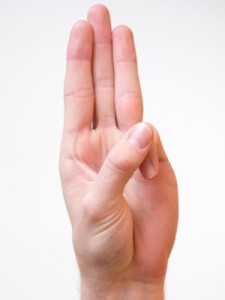 My contract at UK Life Zurich is coming to an end and though I’m sad to be leaving behind the friends I’ve made in the UK Life Communications team I’m also looking forward to the challenge of a new role. However, first I’ve got to get a contract and that means getting back on the recruitment circuit.
My contract at UK Life Zurich is coming to an end and though I’m sad to be leaving behind the friends I’ve made in the UK Life Communications team I’m also looking forward to the challenge of a new role. However, first I’ve got to get a contract and that means getting back on the recruitment circuit.
Well last week I updated the CV, sent it out to all my agency contacts, updated the recruitment websites, (see my article Using Recruitment Websites for details of all the agency and recruitment websites I recommend) applied online for some roles and updated my LinkedIn status to say I’m hunting for a new contract. I’ve also tweeted and updated my MySpace and Facebook status to let my friends and contacts know I’m looking for a job (see my article Networking and Your Online Professional Presence for more information about using social media when job hunting). If you want some general hints and tips about job hunting then you can also read my article aptly titled Hints and Tips for Job Seeking.
I was lucky enough that one of the agency contacts paid dividends and I have an interview set for Monday and as I have generally received very good feedback from interviewers on my interview technique, I thought it would be apt to write an article giving my hints and tips for being successful in an interview.
Happy hunting!
Wealie x
Ten Tips for Successful Interviewing
- Do Your Research
 With the internet full of information there really is no excuse not to have done your research. As a minimum you should check out the “About Us” page of the company you are interviewing with. If you know the name of your interviewer you can do a google search on their name which could give you some useful information.
With the internet full of information there really is no excuse not to have done your research. As a minimum you should check out the “About Us” page of the company you are interviewing with. If you know the name of your interviewer you can do a google search on their name which could give you some useful information.
If you’re going to be working on a specific topic/industry then it’s worth doing a google search on key terms and phrases or go to the industry specific pages (e.g. Delloites and the FSA for financial services) to find out more about a specific subject or just to be up to date with the latest goings on.
- Be Prepared
 It sounds simple and it’s obviously common sense, but often it’s the simple things that we forget. Make sure you know who to ask for at your interview, that you have their name, telephone number/email address, your interview time, the address where the interview is taking place and your travel details printed off and handy in case you need them while in transit.
It sounds simple and it’s obviously common sense, but often it’s the simple things that we forget. Make sure you know who to ask for at your interview, that you have their name, telephone number/email address, your interview time, the address where the interview is taking place and your travel details printed off and handy in case you need them while in transit.
Make a list of any items that you need to take with you, including all of the above, tickets for travel, house/car keys, tissues, pad and pen, portfolio, etc. and anything you’ve been asked by the interviewer to bring along (e.g. photo id, work permit, certificates, etc) and then check it off before you leave the house.
- Dress the Part
 It sounds cliché, but first impressions do count and it’s important that visually you fit in with or exceed the expectations of your interviewer. However, that’s not to say that if you are a builder you should turn up suited and booted – you might just get looked at strangely! It’s important to dress appropriately for the industry and job level that you are applying for. Your clothing will send a message to your interviewer about how you see and represent yourself professionally. So, for ladies make sure skirts aren’t too short and tops aren’t too low. I’d also go easy on the perfume and make up. Remember, it’s not a night out, this is your professional image that you want to project.
It sounds cliché, but first impressions do count and it’s important that visually you fit in with or exceed the expectations of your interviewer. However, that’s not to say that if you are a builder you should turn up suited and booted – you might just get looked at strangely! It’s important to dress appropriately for the industry and job level that you are applying for. Your clothing will send a message to your interviewer about how you see and represent yourself professionally. So, for ladies make sure skirts aren’t too short and tops aren’t too low. I’d also go easy on the perfume and make up. Remember, it’s not a night out, this is your professional image that you want to project.
In terms of office/corporate work you can’t go wrong with the obligatory black or grey suit with a white shirt/blouse, which is clean and ironed. If you feel confident in different colours or types of clothing then that’s great, but remember whatever you wear you need to be able to “own it” to look and feel confident and comfortable (as much as is possible during an interview).
Personal grooming is also important, make sure you’ve bathed recently, wear a reliable deodorant (nothing like interview anxiety to cause you to sweat!), make sure your hair is tidy (ladies with long hair, wearing your hair up/tied back is a good idea to present a professional/tidy appearance), finger nails clean and trimmed and brush your teeth before you leave for the house.
- Leave in Good Time
 Typically your interview might be anything from 1 to 2 hrs, but the time to prepare and get to your interview will probably take just as long, if not longer. Give yourself at least an hour to tidy up your appearance, get dressed and prepare all the items you need to take. Personally I always decide what I’m going to wear and prepare all my items to take the evening before, which takes a bit of the time pressure off.
Typically your interview might be anything from 1 to 2 hrs, but the time to prepare and get to your interview will probably take just as long, if not longer. Give yourself at least an hour to tidy up your appearance, get dressed and prepare all the items you need to take. Personally I always decide what I’m going to wear and prepare all my items to take the evening before, which takes a bit of the time pressure off.
Always aim to be at your place of interview at least a half hour before your interview starts, you’ll need to take this into consideration when thinking about travel arrangements. Once you arrive you can always find somewhere to get a coffee or wait in the car for 15 minutes to compose yourself before going into the building. It makes a good impression to arrive at reception about 15 minutes before you interview is due to start.
Give yourself plenty of time for any travelling you need to do. Also if you’re anything like me you might build in what I call “Lack of any sense of direction time”, which usually is taken up with aimlessly driving/walking about trying to find the location and stopping anyone I can to ask for directions, even when I have a map and written directions I’ve failed to follow adequately!
If for any reason you are going to be late for your interview (it’s happened to me before and I’m pleased to say I still got the job!) then it’s important to let the interviewer know as soon as possible and an estimated time of arrival. Interviewers often see a number of people on the same day, so calling early on any delay you have will help them to make a decision as to whether it would be better to reschedule your interview or fit you in later.
- Bring Examples of Your Work
 It’s always a good idea to come along prepared with examples of your work to show an interviewer. Graphic artists and Web designers always have a portfolio of their work, but why should it just be the preserve of the creative industry?
It’s always a good idea to come along prepared with examples of your work to show an interviewer. Graphic artists and Web designers always have a portfolio of their work, but why should it just be the preserve of the creative industry?
As a communicator and marketing consultant at interviews I always bring examples of my templates, internal promotions, publications I have written for and tools and training that I have created.
Having examples can help you to demonstrate your skills in action and help to inform the interviewer’s understanding of the breadth and depth of your experience. They are excellent talking points and also opportunities to give you a moment to collect your thoughts while the interviewer is looking through them.
If you’re feeling very dedicated you could also create some bespoke materials for the company at which you are interviewing that you’ve based on the research you completed. This is a very useful thing to do if you are perhaps coming in to work on a specific area/topic such as a project.
- Body Language & the Handshake
 An awful lot of research has gone into the importance of body language and in particular the handshake within business. Whilst you don’t need to be an expert in body language, it’s useful to be aware of what your own body language is saying about you and what your interviewer’s is saying about what they think of you. Here are a few quick tips to help you out.
An awful lot of research has gone into the importance of body language and in particular the handshake within business. Whilst you don’t need to be an expert in body language, it’s useful to be aware of what your own body language is saying about you and what your interviewer’s is saying about what they think of you. Here are a few quick tips to help you out.
Keep your body language open, don’t cross your arms over your chest or clasp your hands tightly, these are signs of nervousness, defensiveness and fear. The aim is to appear confident without being arrogant. Sit in a relaxed, but upright position, keep your head up, lightly clasp your hands or take notes. Lean in towards your interviewer when they are speaking, this signals you are interested in what they are saying.
Maintain regular eye contact with your interviewer (if more than one interviewer direct your contact primarily to the person who has asked you a question, but occasionally glance at the other interviewers). Be careful not to let your eye contact become a creepy stare; look away for a moment, this will also give you time to gather your thoughts. Try not to fidget, sit calmly in your seat and keep your hands still. Taking notes is an excellent way to focus the mind and give twitchy hands something to do! Smile – even if you’re not feeling it, smiling makes you seem friendly, accessible and easy to talk to. The very act of smiling also helps to relax you and engender a good mood, which will help you feel more confident in your interview.
All the above hints and tips about body language equally apply to your interviewer, check to see whether they are maintaining eye contact and leaning in, this will tell you how interested/distracted they are. Are they smiling, this helps to let you know if you are building rapport. Do they mimic your own body language, this is a clear sign that you have built rapport and got them interested in what you are saying. Does the interviewer’s body language fit with their words, if not perhaps this is a sign that they are just going through the motions. The people that have a good idea of how they got on in their interviews are those that pay attention to their interviewers, both what they are saying and their body language.
When it comes to the handshake there are many theories, personally my preference is for a short, firm and gentle handshake, with just the one “pump” (i.e. up and down motion), you really can’t go wrong with this. It says, I’m pleased to meet you, I respect you, but I’m not afraid of you and that I’m a confident individual with nothing to prove and as a handshake it’s totally inoffensive. If you suffer from sweaty palms in stress situations like interviews I suggest packing a set of travel tissues in your bag and having one in your suit pocket that you can quickly dry your hand on before you shake. There’s nothing worse in my mind than either of these two handshakes – a limp and wet handshake and the long bone crushing, dominance challenge. The first suggests the owner is afraid of me very nervous, lacking in confidence and perhaps a bit weak of character and the latter suggests that the owner has something to prove, could be overbearing, controlling and could possibly be over compensating.
- Be Yourself
 Another cliché? Possibly, but it’s a good one, after all it’s you that the interviewer is looking to find out about and it’s your personality that will have to work in the environment should you be successful and get the job. There’s a difference between acting professionally and trying to project an image of yourself that is very different from whom you actually are.
Another cliché? Possibly, but it’s a good one, after all it’s you that the interviewer is looking to find out about and it’s your personality that will have to work in the environment should you be successful and get the job. There’s a difference between acting professionally and trying to project an image of yourself that is very different from whom you actually are.
If you present yourself as something other than what you are then you are not doing yourself or the interviewer any favours. It’s likely that the interviewer will see you as coming across phony and you (unless you’re a consummate liar or actor) will find it difficult to stay in character, putting additional pressure on yourself in an already potentially stressful situation. Many of the competency based question styles that are regularly used in interviews now could also trip you up as they are designed to get at the root of the real you and how you deal with real situations.
If you feel you have to act completely differently for an interview you have to wonder if perhaps it is not the right job for you? The best advice I can give is to maintain a professional attitude, whilst being comfortable enough to relax and share your personality with your interviewer. It’s the only way to build rapport with your interviewer, which will greatly increase your chances of being selected for the role.
- Talk About What You Know
 In a way, this is very similar advice to “Be Yourself”. It’s never a good idea to start talking about things you have little or no knowledge of, you never know when you might get tripped up. If you’ve done your research then you can help to reduce this risk, but it’s best to be honest about your level of knowledge. There’s nothing wrong in admitting that you don’t know everything! In fact an interviewer would probably respect you for it.
In a way, this is very similar advice to “Be Yourself”. It’s never a good idea to start talking about things you have little or no knowledge of, you never know when you might get tripped up. If you’ve done your research then you can help to reduce this risk, but it’s best to be honest about your level of knowledge. There’s nothing wrong in admitting that you don’t know everything! In fact an interviewer would probably respect you for it.
If a question is asked that you don’t know the answer to, tell them you can’t answer it. If relevant you can always qualify your answer by saying that it’s something you’d be willing to learn more about once you got the job.
Try to focus your interviewer onto the topics where you can demonstrate your skills and experience to best advantage. However, it’s important not to over use one skill or example experience during an interview. Talk about a wide variety of work experiences and skills that will be of benefit to the role. When people talk from a position of knowledge and experience they naturally become more confident, which will also help you through the interview.
Finally don’t babble or waffle, try to keep your answers clear and succinct. Remember you’ve got between 1 and 2 hours to convince this person that you are the right person for the job, so don’t waste that time endlessly repeating yourself and waffling. Take time to compose yourself before you begin answering a question – really there’s nothing wrong with a bit of silence and your ability to step back and assess your thoughts before you speak is a skill that will definitely be appreciated by your interviewer.
- Remember You’re Interviewing Them too!
 It amazes me how often people forget that an interview is two-way. The interview is as much an opportunity for you to assess whether the role, company, location, pay and benefits is right for you as it is for the interviewer to assess your suitability.
It amazes me how often people forget that an interview is two-way. The interview is as much an opportunity for you to assess whether the role, company, location, pay and benefits is right for you as it is for the interviewer to assess your suitability.
Make sure you ask all the questions that are important to you, will the role provide you with the right level of challenge and how much overtime you need to put in? Check to see whether the benefits (working from home, holiday, car allowance, flexi time, childcare, health care, maternity leave, etc) and pay meet your personal requirements. Is the culture and ethics of the company compatible with your own? What opportunities for advancement are there? How stable is the company and what level of job security will you be provided? What are the pension provisions? It’s important to get as thorough an understanding as possible through your research and the interview before you decide whether to accept the role.
A lot of people think that they can’t turn down a job offer, or feel intensely guilty if they do. It’s too easy to be swayed by persuasive recruitment agents and HR representatives, but if you didn’t feel it was right for you during the application and interview then my advice would be not to take the job.
If you’ve been offered a role, this is also a bargaining position, perhaps the only thing about the job that made you feel you don’t want to take it could be changed. If you’re in this kind of a situation it’s worth starting a dialogue with the recruitment agent/employer to see if there is any opportunity to make the deal fit both yours and their needs. It’s important to remember that the employer needs an employee and you are their chosen candidate so you don’t have to take a job that’s offered to you and it is acceptable to discuss a change to the terms to meet your personal needs. Worst case scenario the employer says no and then you have to decide whether to take the role or look for something more suitable.
In times like these it’s easy to get panicky and just take any job we’re offered on the pay and terms the recruitment agent/employer has given, because the media would have us believe that we’re lucky to have any job, let alone the one we want. However, if you speak to recruiters and employers they often paint a gloomy picture of not being able to find the right candidates for roles, especially in specialist and niche areas. There are plenty of jobs out there and temping or freelance work is something you can do to supplement your income whilst you are looking for a role that’s right for you. There’s nothing worse than getting trapped in a job that you don’t enjoy and often the warning signs are there in your application and interview process. You could find yourself looking for a new job fairly quickly which could have been avoided if you had not accepted the job in the first place. So my advice is to listen to your instincts and make informed decisions.
- Treat it as an Experience, Don’t Take it “too” Seriously
 In the end the thing to remember is that it is just an interview and it might not be your last, even if you do get the job. In the scheme of things whether you get on well with the interviewer or not, whether you thought it went well or awful and whether you were the successful candidate really doesn’t matter. Life will go on regardless of the outcome of this moment in your life and it is important to keep your perspective, remain positive and just not take yourself “too” seriously.
In the end the thing to remember is that it is just an interview and it might not be your last, even if you do get the job. In the scheme of things whether you get on well with the interviewer or not, whether you thought it went well or awful and whether you were the successful candidate really doesn’t matter. Life will go on regardless of the outcome of this moment in your life and it is important to keep your perspective, remain positive and just not take yourself “too” seriously.
The right role is out there for you and just like you’ve got to kiss a few frogs to find your prince/princess you may well have to go through a fair few interviews until the right job finds you. It’s best to enter an interview thinking about the experience it will give you rather than pinning your hopes on the outcome. Each interview will give you new experiences and help you to hone your ability to project your skills and experience in an engaging way to interviewers. By looking at the guaranteed pay-out of an interview (i.e. experience and knowledge) it is much easier to remain positive and upbeat about your time spent job seeking, which in times like these can be a bit longer than we’d like.
To leave you on a less serious note here are three funny comics on interviewing and handshakes by The Oatmeal, they’re well worth a look.
The 6 Crappiest Interview Questions
The 10 Types of Crappy Interviewees
The 9 Types of Crappy Handshakes
I have written a series of articles about job seeking which you might find useful:
Hints and Tips for Job Seeking
Networking and Your Online Professional Presence
Using Recruitment Websites
Job Hunting and Standing Out from the Crowd
Hints & Tips for CV Writing
Infographic CVs
Related articles from other bloggers:
Body Language in an Interview by Fastlaners on the blog Chronicles of the lost graduate.

 Follow Wealie on Feedburner
Follow Wealie on Feedburner Follow Wealie on Google
Follow Wealie on Google RSS feed of Wealie's Blog
RSS feed of Wealie's Blog GeneralWealie on Twitter
GeneralWealie on Twitter Ruth Weal Daily on Paper.li
Ruth Weal Daily on Paper.li Ruth Weal on Facebook
Ruth Weal on Facebook Wealie on Flickr
Wealie on Flickr Wealie on Google+
Wealie on Google+ Wealie on Instagram
Wealie on Instagram Wealie on LastFM
Wealie on LastFM Wealie on MySpace
Wealie on MySpace Wealie's YouTube Channel
Wealie's YouTube Channel GeneralWealie on Google
GeneralWealie on Google info@wealie.co.uk
info@wealie.co.uk Ruth Weal on LinkedIn
Ruth Weal on LinkedIn Ruth Weal on skillpages
Ruth Weal on skillpages Wealie on Brainshark
Wealie on Brainshark Wealie on SlideShare
Wealie on SlideShare Wealie on Etsy
Wealie on Etsy Wealie on Instacanvas
Wealie on Instacanvas Wealie on redbubble
Wealie on redbubble Wealie on Society6
Wealie on Society6